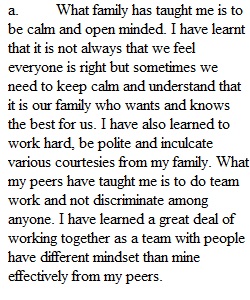


Q Getting Started The symbolic interactionist perspective helps us see how language, gestures, communication patterns, and other symbols affect how we interpret and evaluate those symbols to construct or form our identity. As you interact with others, whether verbally, non-verbally, or online, you continue to interpret those interactions and imbue them with meaning, and this contributes to your sense of self. Charles Cooley, an important figure in sociology, proposed that your self is a reflection of how others view or see you. So, consider this the next time someone tells you that you acted or behaved a certain way: While you may not see yourself in this way, others do and it might be worth considering their perspective of you. Your biases, however, may not allow you to truly review or reflect on how others see you if they clash with your own views of yourself. Perhaps, for example, you do not think of yourself as a “bully,” but someone else gives you an example of a time when they felt bullied by you. This clash between your perception of yourself and how someone else views you may be very hurtful, but it could also lead to powerful changes in how you behave or act towards others in the future. Upon successful completion of this discussion, you will be able to: • Distinguish the agents of socialization in your life and their impact. • Apply the symbolic interactionist perspective to the process of socialization. • Explain the importance of biological and cultural factors in the social process. ________________________________________ Background Information For this discussion assignment, please read the assigned materials and respond to the discussion prompts to gain a deeper understanding of the major influencing factors in the process of your socialization. The processes and influences that determine how you become you are quite amazing! While you are born with certain personality characteristics and temperaments, the people and structures around you play major roles in shaping who you become. Sociology can reveal some of the hidden processes behind becoming you, and, with that, help you gain a better and more nuanced understanding of yourself, as you will explore in Chapter 4. Sociology also has a somewhat different perspective on “deviance” from the common definition. Deviance merely means that people don’t always conform to social constructions or norms. On the one hand, people are encouraged to think critically for themselves. On the other, other forces around you are subtly (and not-so-subtly) influencing you to conform. How you navigate these waters is a component of socialization. You have very likely heard about and thought about social status. Imagine you see your high school classmates hanging around with specific individuals and you bemoan the fact that you are not part of their clique or group. One reason you are not part of their group is due to social status. For various reasons (that sociology describes), you are missing some component or attribute to be included in the clique. Status derives from things you can control (your behaviors), as well as things you cannot control (your appearance). Chapter 5 explores these and other meaningful concepts, including an important perspective referred to as the “social construction of reality,” which proposes that we are all involved in constructing or shaping our reality on a regular basis. The line between what is “real” (tangible) and what we construct (the more intangible ideas) can be fuzzy sometimes. You will learn about this distinction, as well as why this concept is important in sociology. Another important component of human interaction, as well as of sociology, is group dynamics. Sociologists study how humans interact in groups and how groups influence the individuals in them. A famous study by Stanley Milgram (actually, a series of studies) revealed just how much we not only conform in groups, but also obey authority figures. One very important component of the Milgram obedience studies revealed the “outliers”—those who did not as easily obey or conform during the studies. You will learn more about these and other meaningful concepts in Chapter 5. ________________________________________ Instructions 1. Review the rubric to make sure you understand the criteria for earning your grade. 2. In your textbook, Sociology: A Christian Approach for Changing the World, read: a. Chapter 4, “Socialization” b. Chapter 5, “Social Structure, Groups, and Organizations” 3. Download and review the following textbook PowerPoint presentations: a. Chapter 4(PowerPoint presentation) b. Chapter 5(PowerPoint presentation) 4. Navigate to the threaded discussion and respond to the following prompts: a. What have you learned from each of these agents of socialization: family, peers, church, media, and school? How did each of these agents manipulate symbols to socialize you? b. Which two agents of socialization have influenced you the most? Give examples of their influence on your attitudes, beliefs, values, or other orientation to life. c. What is the importance of biological and cultural factors in the socialization process? Provide your rationale for your response. 5. Your initial post is due by the end of the fourth day of the workshop. 6. Read and respond to at least two of your classmates’ postings, as well as all instructor follow-up questions directed to you, by the end of the workshop. 7. Your postings should also: a. Be well developed by providing clear answers with evidence of critical thinking. b. Add greater depth to the discussion by introducing new ideas. c. Provide clarification to classmates’ questions and insight into the discussion. d. Be posted on three different days during the workshop.
View Related Questions